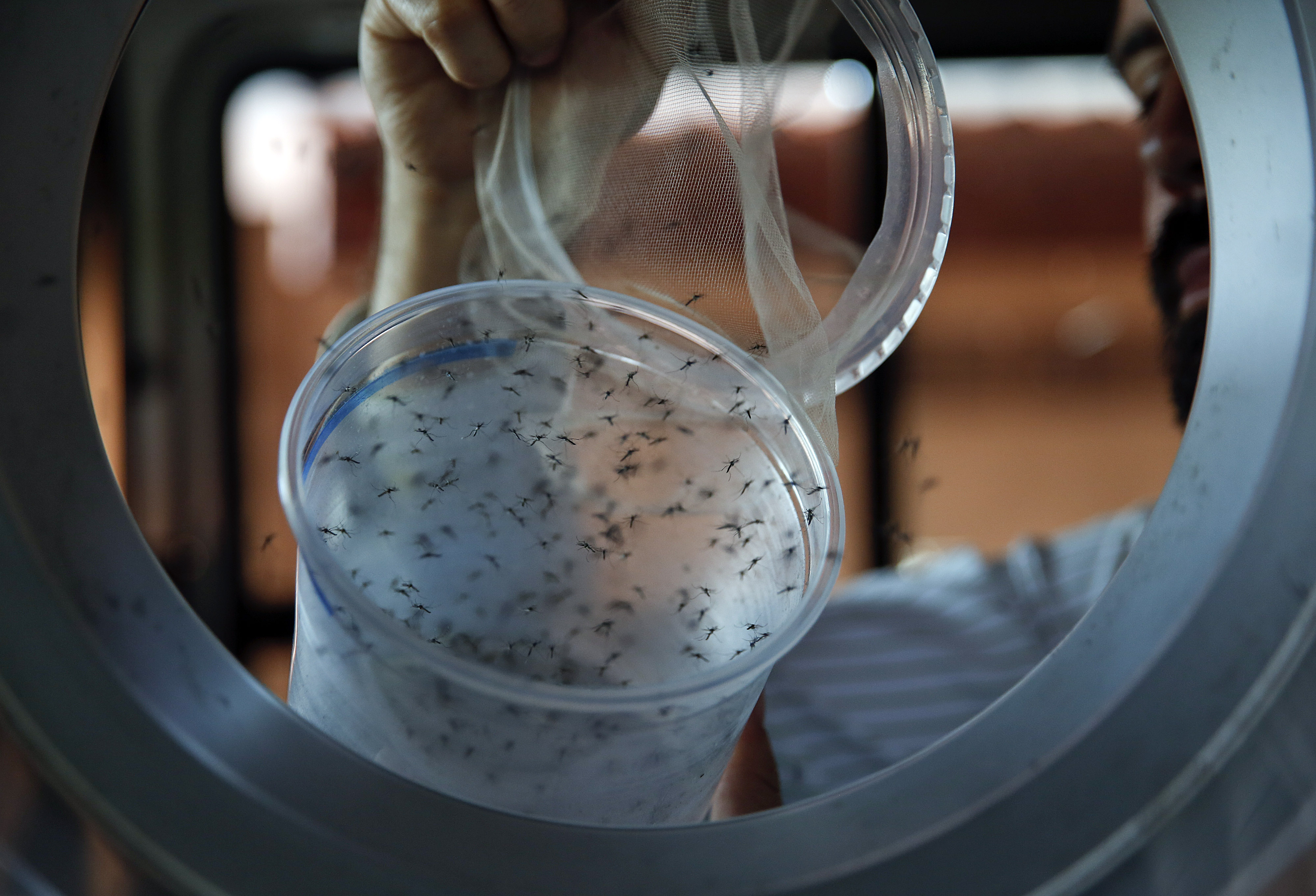How do you solve a problem like the Zika virus?
Researchers are working hard to find a solution. Here's how.


A free daily email with the biggest news stories of the day – and the best features from TheWeek.com
You are now subscribed
Your newsletter sign-up was successful
The rapid spread of the mosquito-borne Zika virus across Latin America and the Caribbean has researchers and health officials scrambling for a solution. They face an almost absurd set of challenges: There is no vaccine, diagnosis is slow and costly, and the mosquitos that carry Zika are growing resistant to many insecticides. What's more, the mosquitoes' eggs — which can be laid in tiny pools of water — can survive for weeks even if the pools dry out, and be ready to hatch with the next rain.
The stakes are high. Scientists believe the virus is what's causing the rash of babies being born with abnormally tiny heads and brains, a condition called microcephaly, and is possibly also linked to Guillain-Barré syndrome, a degenerative disease that can cause paralysis in adults. Although a cure might be years off, research suggests how Zika — and perhaps other mosquito-borne diseases — may eventually be defeated.
The most elegant route may be to bypass the mosquitos altogether. More than a dozen governments and pharmaceutical companies are working on a Zika vaccine, according to the World Health Organization. Some are pursuing traditional vaccines, like the ones used to inoculate against measles and chicken pox; these stimulate the body's immune response by introducing it to either a weakened version of the virus or just its antigens, the molecules from a virus that cause the body to produce antibodies.
The Week
Escape your echo chamber. Get the facts behind the news, plus analysis from multiple perspectives.

Sign up for The Week's Free Newsletters
From our morning news briefing to a weekly Good News Newsletter, get the best of The Week delivered directly to your inbox.
From our morning news briefing to a weekly Good News Newsletter, get the best of The Week delivered directly to your inbox.
The National Institute of Allergy and Infectious Diseases (NIAID) writes that another way, possibly cheaper and faster, would be to follow the blueprint used to create a vaccine for the mosquito-borne West Nile virus. That technique relies on injecting plasmids, DNA molecules — most commonly found inside bacteria cells — that are separate from a cell's chromosomal DNA and can replicate independently. Plasmids have the benefit of carrying the DNA code for their virus' antigens, without being infectious, and so can stimulate the body's autoimmune response. The plasmid-based West Nile virus vaccine was successful in initial clinical tests.
Whatever method virologists use, it will likely take years to develop an effective vaccine. The challenge is getting the vaccine to stimulate an immune response without causing damage itself. "'Do no harm' is always a mantra when it comes to vaccinology," Michael Diamond, from the Infectious Diseases and Vaccine Development Center at Washington University in St. Louis, told Slate. But the urgency of the situation might call for some unusual methods: Barney Graham, a deputy director of the NIAID vaccine research center tells NPR that researchers could quickly winnow their options by simply giving young, healthy (and not pregnant) volunteers prospective vaccines, then injecting them with the Zika virus.
Another key to defeating Zika lies in developing a better way to figure out what's Zika and what isn't. Zika overlaps with other mosquito-borne illnesses like yellow fever, dengue, and chikungunya, all of which often cause similar, flu-like symptoms. Current tests for Zika are slow and expensive, can only be done at a hospital or lab, and not all of them can distinguish between Zika and dengue.
A team of researchers at the University of Alberta's interdisciplinary Ingenuity Lab, though, is trying to create a handheld test for Zika detection that could detect both Zika and dengue, distinguish between them, and be used even before victims show symptoms. Team leader Carlo Montemagno told The Week that the team has identified a protein that could be used to identify Zika's presence, and is working to make sure it's unique to the virus. "Once you have the key that fits, you've got to make sure that key only fits your lock," he said. The test, which will likely look similar to a handheld blood sugar test, could be ready in as little as six months, Montemagno said. "We're moving very, very fast."
A free daily email with the biggest news stories of the day – and the best features from TheWeek.com
And then there are the mosquitoes themselves. The most effective way to get rid of them — and thus all the diseases they carry — might be to get them to breed themselves to death. The "sterile insect technique" calls for releasing swarms of sterilized male insects into the wild. The hope is that they outnumber and outcompete their wild male counterparts to pair with fertile females. The eggs that the female insects then lay won't hatch. The technique, a bit like trying to control a wild horse population by releasing a horde of mules, has been used effectively for agricultural and other purposes for more than 50 years. The International Atomic Energy Agency in Vienna, Austria, is now working to perfect its technique of using radiation to sterilize male mosquitos.
The problem with the sterile insect technique is that, even after the threat is diminished, sterilized males must be continually released to prevent the disease from recurring. Since only female mosquitos bite and transmit disease, a cheaper route might be to create mosquitos that are fertile but only lay male eggs, write Zach Adelman and Zhijian Tu in the journal Trends in Parasitology. The pair have discovered a gene ("Nix") that determines mosquito gender, and envision using CRISPR — the groundbreaking genomic editing technique that allows scientists to efficiently and precisely edit DNA — to create mosquitos that produce only male offspring.
"You are reducing the number of female mosquitos that bite and transmit disease-causing pathogens," Tu told The Week via email. And, "having less and less females over multiple generations will lead to overall reduction or even crash of a local mosquito population." The idea is promising but, as with the other nascent Zika-fighting technologies, effective male-only mosquitos could still be a ways off. "I highly doubt that five years would be enough time for either a vaccine or our technology," says Adelman, "but it would be a wonderful surprise in either case."
In the meantime, the Centers for Disease Control says that people traveling to countries infected with the Zika virus can't go wrong with some simple, proven technologies: mosquito nets, long sleeves, and bug spray.
-
 Why are election experts taking Trump’s midterm threats seriously?
Why are election experts taking Trump’s midterm threats seriously?IN THE SPOTLIGHT As the president muses about polling place deployments and a centralized electoral system aimed at one-party control, lawmakers are taking this administration at its word
-
 ‘Restaurateurs have become millionaires’
‘Restaurateurs have become millionaires’Instant Opinion Opinion, comment and editorials of the day
-
 Earth is rapidly approaching a ‘hothouse’ trajectory of warming
Earth is rapidly approaching a ‘hothouse’ trajectory of warmingThe explainer It may become impossible to fix
